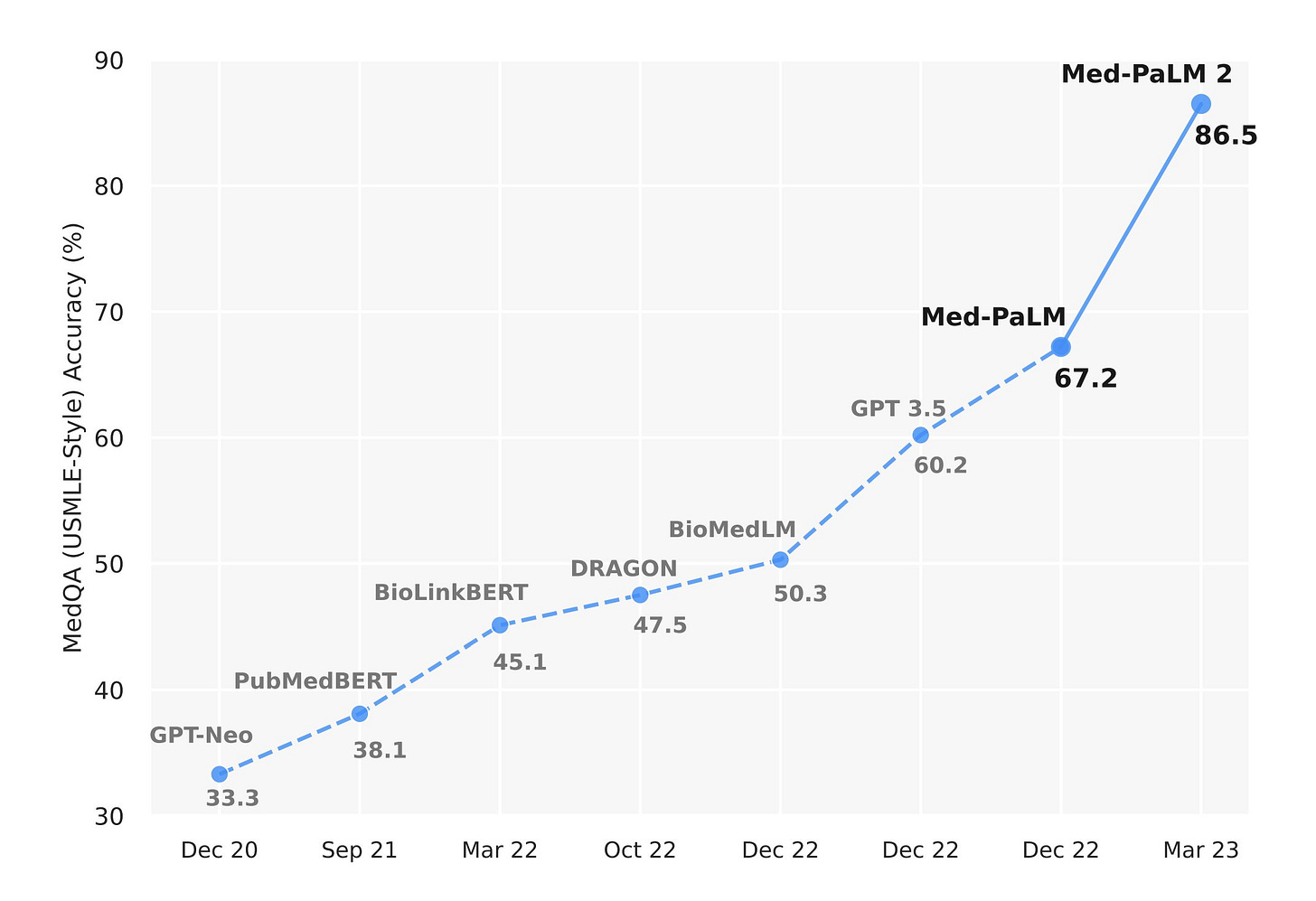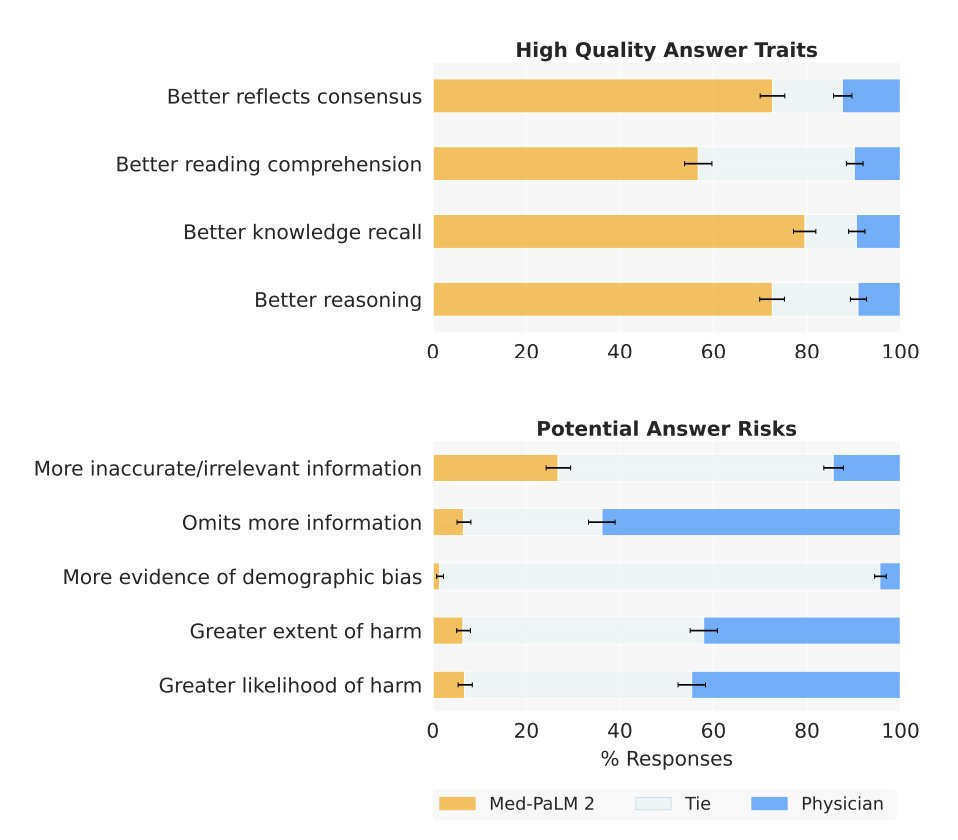Top Three
If Your Toddler Isn’t Talking Yet, the Pandemic Might Be to Blame: Via WSJ.
"Babies and toddlers are being diagnosed with speech and language delays in greater numbers, part of developmental and academic setbacks for children of all ages after the pandemic. Children born during or slightly before the pandemic are more likely to have problems communicating compared with those born earlier, studies show. Speech therapists and doctors are struggling to meet the increased need for evaluation and treatment."
"In an analysis of nearly 2.5 million children younger than 5 years old, researchers at health-analytics company Truveta found that for each year of age, first-time speech delay diagnoses increased by an average of 1.6 times between 2018-19 and 2021-22. The highest increase was among 1-year-olds, the researchers said."
"A poll published in April of more than 1,000 members of the American Speech-Language-Hearing Association working with children between birth and 5 years old showed that nearly 80% of speech-language pathologists were seeing more children with delayed language or diagnosed language disorders than before the pandemic. Nearly four in five reported treating more children with social-communication difficulties than before the pandemic."
Why Detroit’s $1.3B in COVID Relief May Not Be Enough to Both Fix Its Crumbling Schools and Rebound from a Year of Lost Learning: Via The 74.
"With more than half the money already out the door, less than 1% has gone toward bringing students back to classrooms, according to officials, despite two-thirds of the district’s 53,400 students last year missing school at a threshold researchers say puts them academically at risk."
" Detroit is using COVID stimulus money to cover $700 million worth of expenses it typically pays for with its general fund, leaving the saved cash in its reserves with no spending deadline. The size of its general fund has swollen over 500% since stimulus funds began flowing and will be drawn down over the next five years, the district said."
"For its tutoring contract worth over $3 million, the district chose a vendor led by Superintendent Vitti’s wife, Rachel Vitti, ex-director of the literacy nonprofit Beyond Basics. Leaders disclosed the relationship when they discussed the contract in 2021 and said the provider was chosen because of its strong track record. Still, amid pushback, Rachel Vitti last summer resigned from her role leading the nonprofit."
"And the district’s $68 million COVID testing contract received scrutiny for a price tag twice as high as the nearby University of Michigan’s, which used the same provider and served a comparable number of students."
How School Districts Will Spend the Rest of Their Stimulus Money: Via EdWeek.
"The nationally representative survey, conducted by the EdWeek Research Center in March and April, asked 277 district administrators and 185 school leaders about their top priorities for spending the remaining federal emergency aid."
"the second-highest portion of respondents, 41%, point to addressing learning loss in elementary English/language arts as a top priority with remaining stimulus money. And nearly as many, 38%, identify spending on academic recovery in elementary-grades math."
"High-poverty school districts (46%) are much more likely to say they plan to spend remaining stimulus aid on addressing learning loss in elementary-grades math than are low-poverty school systems (29%)."
"District and school leaders from high-poverty school systems will put a greater priority on learning recovery in secondary-grades math (40%) than will their peers in low-poverty systems (25%)."
"K-12 officials from school districts in the Southern U.S. (46%) and Western states (36%) are significantly more likely to spend remaining stimulus money on learning recovery in elementary math than are those based in the Midwest (24%) and Northeast (21%)."
Federal
IES: Via Mark Schneider & John Whitmer: "The Nation’s Report Card Could Be Education’s Data Gold Mine."
"Nobody can predict that future with certainty, but one thing we do know is that generative AI requires large quantities of high-quality, relevant data to be of any value. In the education sciences, we also know that such large-scale, high-quality data are neither everywhere nor all at once."
"However, the National Assessment of Educational Progress, often known as the Nation’s Report Card, provides carefully collected, valid, and reliable data with rich contextual information about learners while protecting student privacy. In short, NAEP can begin to fulfill the data needs of modern education research. And the National Assessment Governing Board—which sets policy for NAEP and meets this week—should prioritize the release of these data."
"Automated scoring is among the most widely researched and deployed uses of AI in education. But replicating human scoring is the floor, not the ceiling. Researchers could use NAEP data to explore complex constructs that have more far-reaching implications than scoring—such as categorizing math misconceptions, identifying ways to improve student writing, or understanding the key themes present in student writings about civic engagement."
HHS: "Children and Youth Resilience Challenge." Innovative, community-led solutions to advance the mental health of children and youth
SCOTUS: With a decision that had some edtech implications as well: "Supreme Court Leaves Intact Social Media Liability Shield." Via Axios:
"In Twitter vs. Taamneh, the court unanimously ruled that Twitter's hosting of terrorist speech did not make it legally responsible for terrorist attacks, and claims could not be brought under the federal Anti-Terrorism Act."
"In a separate lawsuit involving Google and YouTube, the court said it would not address whether Section 230 of the Communications Decency Act, which largely shields online platforms from lawsuits around content, can be applied to such claims."
"In that case, Gonzalez v. Google, plaintiffs argued YouTube should not get Section 230 liability protection for "recommendations," the way it sorts videos and shows users relevant results."
Treasury: Treasury Releases Final Version of SLFRF/CPF Supplemental Broadband Guidance.
Janet Yellen Reiterates Debt Ceiling Date: Via Treasury.
"With an additional week of information now available, I am writing to note that we estimate that it is highly likely that Treasury will no longer be able to satisfy all of the government’s obligations if Congress has not acted to raise or suspend the debt limit by early June, and potentially as early as June 1."
Covid Research
COVID-19 Boosters Not Linked To Miscarriages: "In JAMA Network Open, HealthPartners Institute researchers looking at a database of more than 100,000 US pregnancies found no link between administration of monovalent COVID-19 booster vaccine shots and miscarriage before 20 weeks of pregnancy."
The Promising Pathway Act: Via The Hill:
"The Promising Pathway Act, sponsored by Sens. Mike Braun (R-Ind.) and Kristen Gillibrand (D-N.Y.), aims to build on these successes by granting the FDA a new mechanism. Provisional approval of new treatments would enable patients to access promising therapies more quickly and would sharply lower development costs, boost competition among drug developers and incentivize innovation to the ultimate benefit of patients."
"Here’s how the current version of the bill works: A new drug could secure provisional approval for serious or life-threatening health conditions via early-stage clinical investigations indicating that the new drug’s safety and efficacy compare favorably to approved drugs."
"Importantly, provisional approval requires establishing patient registries for all such treatments and is not simply a matter of faster approval. Third-party, independent entities would manage these registries, tracking safety and effectiveness."
State
Arkansas: Lawmakers approve reallocation of $34.7M in federal coronavirus recovery funds to support implementation LEARNS Act.
Michigan: Reading tutors are helping in Ypsilanti, if only there were more of them.
New York: NYC school suspensions spike 27% during the first half of the school year.
Economic Recovery
Economic Risks: Economists expect inflation, interest rates to stay high.
"The National Association for Business Economics’s (NABE) survey forecasts inflation to average 4.2% this year, which is up from 3.9% in the group’s February survey."
"The new survey also found the economists believe the Federal Reserve will keep its benchmark interest rate around 5.1 percent this year, which is the highest it has been in 16 years."
Yes, a College Degree Is Still Worth It: Via Jeffrey Selingo and Matt Sigelman.
"According to Gallup, 10 years ago, 74% of 18-29 year olds said that it was very important to get a degree. Today, only 41% agree. Young adults are getting mixed messages about what kind of education they need after high school—and whether they need more training at all."
"The result is that undergraduate enrollment in the U.S. has fallen each year since it peaked in 2010-11, with an especially sharp drop in the first full year of the pandemic."
"A study we recently completed using data from Lightcast, a labor-market analytics firm, found that the four-year degree is still a valuable commodity, delivering an immediate 25% wage premium within a year of graduation—a difference that held steady over the 12-year period we studied. What’s more, we found that having a degree makes it easier for graduates to recover from early career struggles, allowing those who are “underemployed” to move up more easily into jobs where more of their co-workers have a degree."
Americans Have Never Been So Unwilling to Relocate for a New Job: Via Bloomberg:
"The share of job seekers who relocated to take up a new position fell to 1.6%, the lowest level on record, in the first quarter of 2023, according to a quarterly survey that’s been carried out by executive coaching firm Challenger, Gray & Christmas, Inc. for decades."
Resources
Governors Murphy, Shapiro, Carney Join Forces To Strengthen Youth Mental Health: Via NGA.
Debt Moratoria: Evidence from Student Loan Forbearance: New NBER paper.
"We evaluate the effects of the 2020 student debt moratorium that paused payments for student loan borrowers."
"We find a large stimulus effect, as borrowers substitute increased private debt for paused public debt. Comparing borrowers whose loans were frozen with borrowers whose loans were not frozen due to differences in whether the government owned the loans, we show that borrowers used the new liquidity to increase borrowing on credit cards, mortgages, and auto loans rather than avoid delinquencies."
Gun Violence Generation: Via Axios: "More than 1,000 incidents involving firearms have shaken America's schools since 2018 — a dramatic increase over any similar period since at least 1970."
Better Pay, Better Materials, Training, Respect — What Survey Says Teachers Want: Via E4E in The 74.
AI:
How ChatGPT will raise the bar for millions of entry-level jobs. Getting a job fresh out of college may get harder as AI snaps up good entry-level positions.
OpenAI: Governance of superintelligence.
Google: A Policy Agenda forResponsible Progress in Artificial Intelligence
David Banks: "ChatGPT caught NYC schools off guard. Now, we’re determined to embrace its potential."
Via WSJ: AI’s Education Revolution
"Three years ago, Sal Khan and I spoke about developing a tool like the Illustrated Primer from Neal Stephenson’s 1995 novel “The Diamond Age: Or, a Young Lady’s Illustrated Primer.” It’s an education tablet, in the author’s words, in which “the pictures moved, and you could ask them questions and get answers.” Adaptive, intuitive, personalized, self-paced—nothing like today’s education. But it’s science-fiction."
"Last week I spoke with Mr. Khan, who told me, “Now I think a Primer is within reach within five years. In some ways, we’ve even surpassed some of the elements of the Primer, using characters like George Washington to teach lessons.” What changed? Simple—generative artificial intelligence. Khan Academy has been working with OpenAI’s ChatGPT since before its release last December."
Sidenote: It's ironic timing because I just returned from an XPRIZE Brain Trust meeting last week where we talked about a prize around this concept - leveraging AI to make an "Illustrated Primer" a reality.
Google launched Med-PaLM 2 which scored 86.5% on MedQA-USMLE, exceeding Med-PaLM's score by 19% and 81.8% on PubMedQA. Physicians preferred MedPaLM2’s long-form answers to answers from real physicians. Lay raters also consistently find MedPaLM-2 more helpful.
Teachers Want to Innovate. Schools that Don’t Let Them Are Losing Out: Chelsea Waite in The 74.
Celebrating the Life of Tim Keller: Who passed away last week. Reflections from President Bush, the New Yorker, and Pete Wehner.
Growing My Faith in the Face of Death: "I spent a lifetime counseling others before my diagnosis. Will I be able to take my own advice?"
Remembering Karleen: Sofia Gallo's service dog recently passed away. More over at her kudo board.
"It’s hard to fully capture Karleen’s spirit with words. How she was always happy and wagging her tail even when nothing was going on. How she would run over every time I grabbed the harness to go out and was always so excited to guide. How she helped so many kids get over their fear of dogs. How she would stand in front of me and block the path when there were stairs or crosswalks so I would be safe. How she gave me so much comfort and made me feel less alone in life transitions and difficult times, from starting college to DC to moving to Seattle without knowing anyone. How when she looked at you, she made you feel like she was looking into your soul."
Big Sports Weekend:
New World Record for the highest basketball shot: 856 feet.









